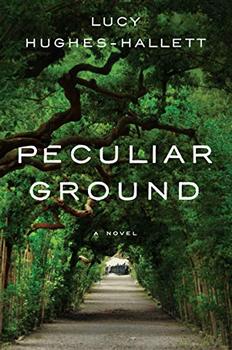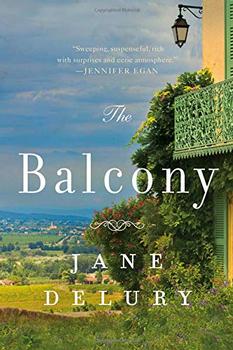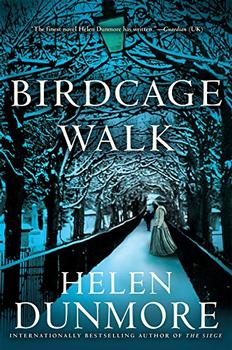Summary | Excerpt | Reviews | Beyond the book | Read-Alikes | Genres & Themes | Author Bio

Critics' Opinion:
Readers' Opinion:
First Published:
Jan 2018, 464 pages
Paperback:
Jan 2019, 464 pages
 Book Reviewed by:
Book Reviewed by:
Cynthia C. Scott
Buy This Book
The Costa Award-winning author of The Pike makes her literary fiction debut with an extraordinary historical novel in the spirit of Wolf Hall and Atonement - a great English country house novel, spanning three centuries, that explores surprisingly timely themes of immigration and exclusion.
It is the seventeenth century and a wall is being raised around Wychwood, transforming the great house and its park into a private realm of ornamental lakes, grandiose gardens, and majestic avenues designed by Mr. Norris, a visionary landscaper. In this enclosed world everyone has something to hide after decades of civil war. Dissenters shelter in the woods, lovers rendezvous in secret enclaves, and outsiders - migrants fleeing the plague - find no mercy.
Three centuries later, far away in Berlin, another wall is raised, while at Wychwood, an erotic entanglement over one sticky, languorous weekend in 1961 is overshadowed by news of historic change. Young Nell, whose father manages the estate, grows up amid dramatic upheavals as the great house is invaded: a pop festival by the lake, a television crew in the dining room, a Great Storm brewing. In 1989, as the Cold War peters out, a threat from a different kind of conflict reaches Wychwood's walls.
Lucy Hughes-Hallett conjures an intricately structured, captivating story that explores the lives of game keepers and witches, agitators and aristocrats; the exuberance of young love and the pathos of aging; and the way those who try to wall others out risk finding themselves walled in. With poignancy and grace, she illuminates a place where past and present are inextricably linked by stories, legends, and history - and by one patch of peculiar ground.
Excerpt
Peculiar Ground
I had never been inside a theatre then. Perhaps otherwise I might have judged the play, or masque, or ballet (I hardly know what to call it) more stringently. But there is an especial piquancy in seeing one's friends play-acting. They are recognisably themselves, but they are also strange. The doubleness is at once frightening and delicious, like conversing with a friend standing behind one's back, while watching her face in a looking-glass.
My cousin sat majestically enthroned in the centre of the audience, shining like the pale spring sun in his silvery silks. His wife was beside him until, mid-way through the show, she rose, cast aside her mantle and, walked onto the stage, transforming herself as she did so from great lady to adventurous libertine. The audience – both the gentry seated in tiered rows around the amphitheatre and hoi polloi (myself among them) standing behind to peer through the arches of the pergola - seemed alike to ...
At 446 pages long, the novel can be very exacting in its determination to lay out its themes, following a cast of characters as they fall in and out of love, marry, divorce, grow up, become parents, and bury loved ones. It is beautifully written and smartly observed, but the book gets bogged down in parts. Readers are rewarded with themes that are as relevant today as they were hundreds of years ago. Peculiar Ground offers a glimmer of possibilities for how lives without borders might actually be lived...continued
Full Review
(573 words)
This review is available to non-members for a limited time. For full access,
become a member today.
(Reviewed by Cynthia C. Scott).
 Philip Pullman
Lucy Hughes-Hallett's novel is immensely vivid, full of rich and deeply imagined life, and glowing with energy. Her Wychwood estate is utterly real, her characters (both seventeenth- and twentieth-century) entirely convincing, and the story moves with a masterful assurance.
Philip Pullman
Lucy Hughes-Hallett's novel is immensely vivid, full of rich and deeply imagined life, and glowing with energy. Her Wychwood estate is utterly real, her characters (both seventeenth- and twentieth-century) entirely convincing, and the story moves with a masterful assurance. Roddy Doyle
Peculiar Ground is so clever and beautifully written, it gripped me from start to end. I abandoned work and family to finish it.
Roddy Doyle
Peculiar Ground is so clever and beautifully written, it gripped me from start to end. I abandoned work and family to finish it. Tessa Hadley
Unlike anything I've read. With its broad scope and its intimacy and exactness, it cuts through the apparatus of life to the vivid moment. Haunting and huge, and funny and sensuous. It's wonderful.
Tessa Hadley
Unlike anything I've read. With its broad scope and its intimacy and exactness, it cuts through the apparatus of life to the vivid moment. Haunting and huge, and funny and sensuous. It's wonderful.The Wychwood of Lucy Hughes-Hallett's novel Peculiar Ground, an English estate built in the 1600s, sets the stage for the personal intrigues of characters spanning several centuries and generations. Secluded from the rest of the public, the estate and its enclosed garden are also symbols of social divisions and how they often trap people. Though Hughes-Hallett based Wychwood on a garden she often visited in Oxfordshire, she took liberties with certain details to make it her own.
An example of a typical English garden of that era can be found at Chastleton House near Moreton-in-Marsh, Oxfordshire. Chastleton House is a remote estate that was built between 1607 and 1612, for Walter Jones, who came from a family of successful wool ...
This "beyond the book" feature is available to non-members for a limited time. Join today for full access.

If you liked Peculiar Ground, try these:

by Jane Delury
Published 2019
A century-spanning portrait of the inhabitants of a French village, revealing the deception, despair, love, and longing beneath the calm surface of ordinary lives.

by Helen Dunmore
Published 2018
Weaving a deeply personal and moving story with a historical moment of critical and complex importance, Birdcage Walk is an unsettling and brilliantly tense drama of public and private violence, resistance and terror from one of our greatest storytellers.





The Flower Sisters
by Michelle Collins Anderson
From the new Fannie Flagg of the Ozarks, a richly-woven story of family, forgiveness, and reinvention.

The House on Biscayne Bay
by Chanel Cleeton
As death stalks a gothic mansion in Miami, the lives of two women intertwine as the past and present collide.

The Funeral Cryer by Wenyan Lu
Debut novelist Wenyan Lu brings us this witty yet profound story about one woman's midlife reawakening in contemporary rural China.
Your guide toexceptional books
BookBrowse seeks out and recommends the best in contemporary fiction and nonfiction—books that not only engage and entertain but also deepen our understanding of ourselves and the world around us.